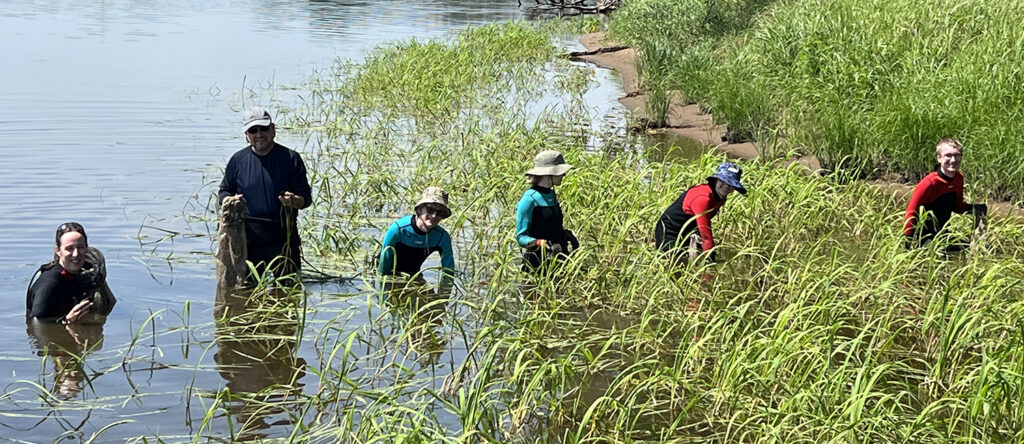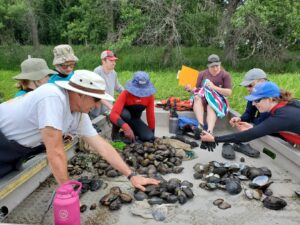
With a grant from the Freshwater Collaborative of Wisconsin, seven UW-Platteville students worked with faculty mentors to conduct fish, mussel, and habitat surveys at eight different stream sites in the Grant, Platte, and Blue River watersheds to help assess stream restoration efforts of the Harry and Laura Nohr Chapter of Trout Unlimited and Wisconsin Department of Natural Resources. They also participated in a mussel relocation project with the U.S. Army Corps of Engineers. In this photo, UW-Platteville students and faculty search for native mussel species./Photo by Rebecca Doyle-Morin
Mussels play a critical role in the health of Wisconsin’s rivers and streams, but according to the Wisconsin Department of Natural Resources, nearly half of Wisconsin’s native mussels are listed as endangered or threatened, with even more listed as species of concern.
Wisconsin conservation groups and resource agencies have implemented stream restoration projects to help conserve the mussels, but their capacity to assess, monitor and survey the numerous streams and communities in the state is limited.
Throughout the summer 2022, a team of undergraduate students from UW-Platteville helped fill the void. With a grant from the Freshwater Collaborative of Wisconsin, seven students worked with faculty mentors to conduct fish, mussel and habitat surveys at eight different stream sites in the Grant, Platte and Blue River watersheds to help assess stream restoration efforts of the Harry and Laura Nohr Chapter of Trout Unlimited and the Wisconsin Department of Natural Resources (WDNR).
“We got so excited when we found mussels. We went to all these backroads and to river crossings not knowing if we’d find anything,” says Lindsey Ockerlander, criminal justice and biology double major who will graduate in December 2023 and begin working at Prevention Genetics. “For two weeks we found nothing, and on the last day we found 10 different species of mussels. We were on cloud nine.”

Students and faculty identified 10 types of native mussels. Wisconsin conservation groups and resource agencies have implemented stream restoration projects to help conserve the mussels, but their capacity to assess, monitor and survey the numerous streams and communities in the state is limited. The student research provided valuable information that was presented at the annual meeting of the Nohr Chapter of Trout Unlimited and contributed to a report that was provided to the Nohr Chapter, WDNR and local landowners. /Photo by Rebecca Doyle-Morin
In addition to documenting mussel species, students had a unique opportunity to participate in a mussel relocation effort that was part of a U.S. Army Corps of Engineers project to mitigate bank erosion on Goose Island in the Mississippi River.
“Prior to any bank work, the mussels in the area needed to be relocated out of harm’s way,” says Kristopher Wright, biology professor at UW-Platteville and lead researcher on the Freshwater Collaborative grant. “We joined the collaborative team that included the Army Corps of Engineers, U.S. Fish & Wildlife Service, Wisconsin DNR and Minnesota DNR.”
The mussel work built upon previous undergraduate research, including that funded by the Freshwater Collaborative in 2020 and 2021. This grant provided the opportunity to integrate fish surveys to supplement Trout Unlimited’s management and restoration efforts.
The students presented their findings at the annual meeting of the Nohr Chapter of Trout Unlimited and contributed to a report that was provided to the Nohr Chapter, WDNR and local landowners.
Carol Murphy, president of the Nohr Chapter of Trout Unlimited, says the students’ research will help them in their mission to conserve, protect and enhance the cold water streams of southwest Wisconsin.
“The monitoring and evaluations provide essential data on the health of our streams, before, during and after our restoration efforts,” she says. “This project collaboration with UW-Platteville continues to be an invaluable and enjoyable highlight to our chapter!”
Not only will the data provide valuable insight into local watershed management, but the students gained hands-on field experience that will prepare them for the workforce. For biology majors Myah Sierens and Chloe Mellody, fish shocking was one of the most interesting skills they learned. They were surprised to find so many different types of fish, even in narrow spots of the rivers.
“I really love fish, so I think the most useful skills that I learned were fish identification, how to handle fish, how to find fish, and what signs to look for in an environment when you’re looking for fish,” Mellody says. “The most important thing for me was learning how to do formal surveying when it comes to habitat and invertebrates. It will make it a lot easier for me to learn how to do field work.”
Tyler Vargas, who graduates in December, says the experience went beyond research skills.
“The most important thing I gained was learning the value of teamwork while doing field research and taking advantage of every team member’s strengths,” he says. “The research project helped me discover new career paths that I didn’t even know existed before. It also gave me skills that I can translate to future tasks and opportunities when working with others. ”
Read more about the student’s experiences: UW-Platteville Students Spotlight: Mussel and Fish Surveying
